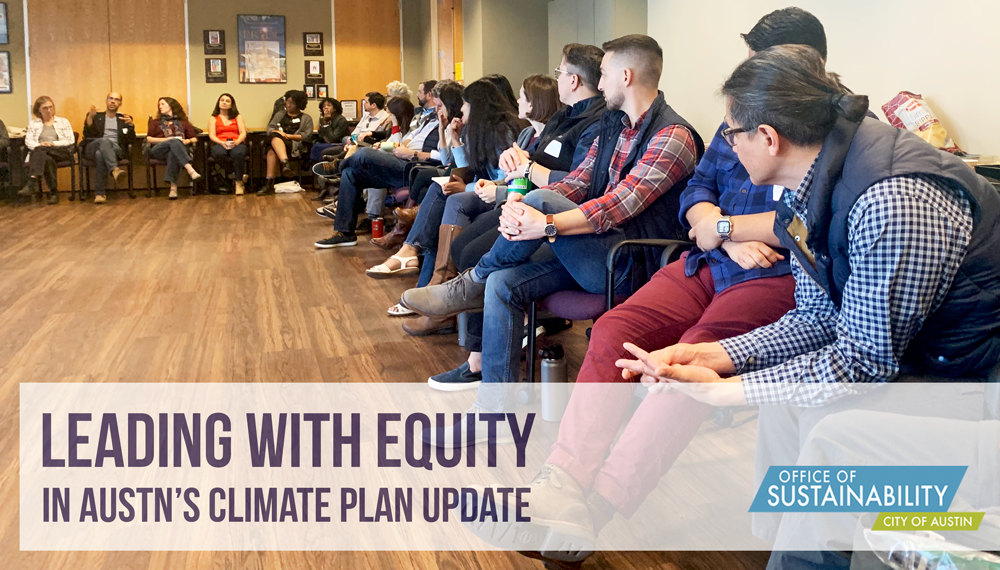Leading with equity in Austin’s Climate Plan update

As we embark on revising Austin’s Community Climate Plan, a lot has changed since we created our first plan in 2015. We now know that climate change is happening faster than we thought, and that the landscape of potential solutions has changed in terms of cost and technology. We also know that climate solutions have the potential to improve everyone’s quality of life, but climate change impacts don’t affect everyone equally. This is why we are leading with racial equity and learning from the lived experience of people in our community as we explore solutions to the climate crisis.
As part of our planning process, we convened six advisory groups that will focus on specific topics related to energy, transportation, food, and access to nature. We also launched a Climate Ambassadors Program that will give us the opportunity to hear from people in our community who have been historically left out of the conversation.
All-in-all, this effort includes over 130 people who will meet over the course of six months. In order to give everyone a foundation and common understanding of racial equity and environmental justice issues, we asked that everyone participate in an equity-focused workshop.

Laying the foundation for racial equity
In creating the workshop, our goal was to have authentic and meaningful conversations around race, class, and equity in the context of Austin’s history. We chose Dr. Tane Ward to lead the discussion, because he has over 15 years of experience in facilitation with a focus on social issues and expertise in racial and climate justice.
Through the course of the workshop, Dr. Ward helped create the space to discuss the history and legacy of colonialism. The conversations were meant to challenge and address long-held perspectives, and create an understanding of how economic and racial segregation impact health, education, and wealth outcomes. As part of the workshop, Dr. Ward offered the following Justice Litmus test:
-
Is there a sense of urgency in our work?
-
Are we using either/or thinking or decision-making?
-
Is our work displaying signs of paternalism?
-
Is there fear of open conflict in our work?
-
Is the right to comfort being prioritized in our work?
-
Are we applying tunnel vision to our work?
-
Are we avoiding “reinventing the wheel” in our work?
-
Does growth or money reflect our values?
-
Are leaders being nurtured and developed horizontally?
-
Is open critique of our work met with “aggressive appreciation” to minimize the critique or avoid discomfort?
These principles are meant to act as a screening process to help us shift our thinking and behavior in ways that are meant to defeat white supremacist culture. We will be using the Justice Litmus test as a tool to help keep us accountable as we build a plan that is actionable and will result in real change as we strive for climate justice in our community and beyond.
Reflections and takeaways
After the workshop, we asked a couple of participants to reflect on what they took away from the exercise, and how it will impact their work in the future. Here’s what they had to say:
"The workshop prompted us to engage in meaningful discussions about how urban plans reproduce racial injustice. We walked through a series of exercises to envision how the Climate Action Plan can advance equitable solutions. This created a critical foundation for how the group will plan a more green and just Austin." – Miriam Solis, Assistant Professor at the UT School of Architecture
“My experience at the workshop was extremely insightful and full of inspirational nuggets. I plan to apply what I learned in a couple ways. The first is through my day to day job as a Landscape Architect Designer. I plan to emphasize the need for a more equitable lens through more community engagement, using sustainable materiality, and taking into account the socioeconomic impact of the projects I am a part of. The second way is to educate myself more on the history of Austin and other equity issues so I can apply it to my work. Overall, the workshop has broadened my perspective of the relationships between people and place, and ultimately in realizing how the racial divide is still very apparent.” – Francisco J Rosales, Landscape Architect Designer, TBG Partners
If you’d like to get involved in the Climate Plan Process, please consider attending one of our five community workshops around Transportation, access to nature, consumerism, and sustainable buildings. You can see the full schedule here under “Get Involved”.
